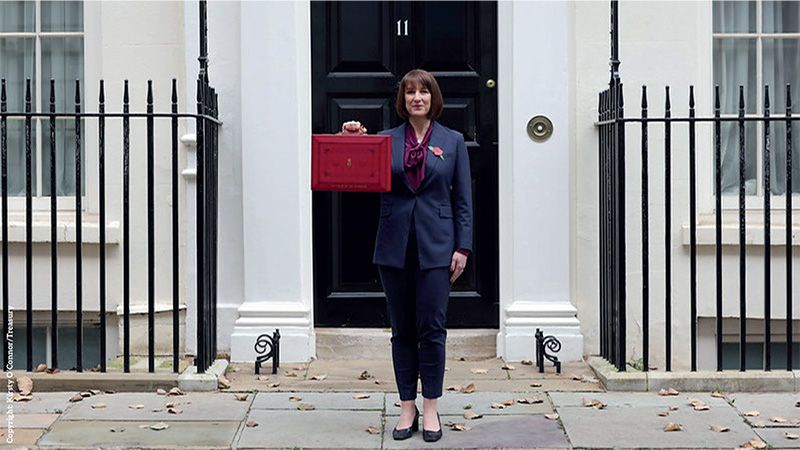More details have been revealed about the government’s “modern industrial strategy”, with greater investment in sectors with “the biggest growth potential”, as part of the government’s Autumn Budget announcement today (30/10).
In Labour’s first Budget in 14 years, the government doubled down on its commitment to the National Wealth Fund and GB Energy, with chancellor Rachel Reeves saying the only way to get the economy growing again is to “invest, invest, invest”.
Below are the major announcements.
‘Modern industrial strategy’
Chancellor Reeves announced more details about the National Wealth Fund, with the aim to catalyse investment and drive the government’s modern industrial strategy, setting out the sectors with the “biggest growth potential”.
This includes nearly £1bn for the aerospace sector, over £2bn for the automotive sector and up to £520m for a new Life Sciences Innovative Manufacturing fund.
Additionally, she said the government would protect investments in research and development to “unlock the growth industries of the future”. The chancellor announced more than £20bn of funding, including at least £6.1bn to protect core funding for areas such as engineering, biotechnology and medical science.
The government is also committed to making Britain “a clean energy superpower”, Reeves said, announcing there would be large, multi-year investments into carbon capture and storage alongside the formation of 11 new green hydrogen projects, described as “among the first commercial-scale projects anywhere in the world”.
There would also be £3.4bn of funding for plans to increase energy efficiency in homes.
Details for the funding of GB Energy are set to be revealed next year, and, overall, the government expects to spend £100bn in capital spending over the next five years.
Sophie Lawrence, stewardship and engagement lead at Greenbank, commented: “Investors have been clear for over a decade in their message that climate change presents a systemic risk to financial systems and that policy decisions which support an orderly transition to a low-carbon economy are essential if we are to avoid the worst economic, social and environmental impacts of climate change. Consistent policy signals are vital to give businesses and investors the confidence to invest in the clean energy transition.
“However, it is important that the Government’s investment in carbon capture and storage (CCS) and hydrogen does not distract from investment in more sustainable solutions such as renewable energy or divert company efforts to decarbonise their business models. CCS and hydrogen should be reserved for the harder to abate areas of the economy rather than used to justify continued use of polluting technologies.
Richard Lum, co-chief investment officer at Victory Hill Capital Partners, added that “bigger isn’t always better” on the path to net zero: “Successive UK governments have focused on large-scale transition projects, and their planned investments in carbon capture and storage and green hydrogen, confirmed in the Autumn Statement, suggest our policymakers are following in their predecessors’ footsteps.
“While government support to de-risk this sort of huge investment has been impactful, these projects must not eclipse the pivotal role of mid-market developers. There are firms already delivering commercially viable, distributed solutions to bridge the gap between the UK’s energy needs and existing infrastructure, but meaningful government incentives are essential for them to thrive in the long term.”
Oil and gas windfall tax increase
Announced prior to the Budget, the government has increased the windfall tax on the profits oil and gas firms make in the UK, rising to 38% from 35% on 1 November until 31 March 2030.
However, Reeves said the government would remove the 29% investment allowance to ensure that the oil and gas industry can protect jobs and support the UK’s energy security, while maintaining the 100% allowances and the decarbonisation allowance
An analysis from Offshore Energy UK, published last month, asserted that the proposals to extend the windfall tax on the oil and gas sector “will deter the very investment needed across our energy landscape”, with CEO, David Whitehouse, commenting that the North Sea “is a strategic national asset and must be treated as such”.
“Windfall taxes extended on oil and gas producers when no windfall exists deter the very investment that we need across our energy transition,” he continued.
“While we use oil and gas, we must surely prioritise investment in our homegrown production, value in our economy, and our jobs.”
Despite this, James Alexander, CEO of the UK Sustainable Investment and Finance Association, explained that this 3% increase would bring the UK in line with Norway, and could provide catalytic public investment to drive private capital into the UK’s energy transition.
“This is sensible financial planning for the future and is essential to deliver a just transition by creating jobs in the energy sector that will actually stand the test of time. North Sea oil and gas is finite and already dwindling, and since it’s traded on the global market it is subject to price shocks like those which caused the energy crisis.
“The government has had to hold firm in the face of relentless lobbying by oil and gas interest groups in order to put up the windfall tax. Oil and gas firms have consistently failed to invest in the transition, and as such are now increasingly being consigned to the past.”
Social impact investment vehicle
In the text from the Budget, it was announced that the government will begin work to develop a social impact investment vehicle, led by the chief secretary to the Treasury, working with DCMS, to support the government in delivering its missions.
According to the statement, this will bring together socially motivated investors, the voluntary sector and government to tackle complex social problems, and will be designed and developed through engagement with the sector. Further details are to be announced in Phase 2 of the Spending Review.
In response, Better Society Capital chair, Robin Hindle Fisher said: “This announcement is a hugely significant one. Through the growth of the social investment market, we have seen the value that impact-aligned capital can provide to tackling complex social problems. At such a critical time for the UK, we stand ready to work with the Treasury and DCMS to ensure that impact capital fulfils its full potential in changing lives for those that need it.”








